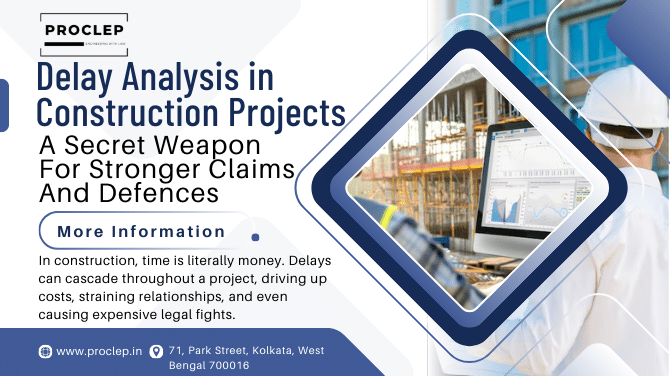In construction, time is literally money. Delays can cascade throughout a project, driving up costs, straining relationships, and even causing expensive legal fights. That’s where Delay Analysis in Construction Projects comes in — and if you’re not utilizing it to its full potential, you could be leaving money (or protection) behind.
Today, let’s explore how to master delays. It isn’t only about schedules—it’s about creating stronger claims and defenses that can salvage your project, your reputation, and your bottom line.
What is Delay Analysis in Construction Projects?
Delay analysis, in simple terms, is a process of finding out why, how, and when a project was delayed. It’s about connecting the cause (an unexpected site condition, a design change, a labor shortage, etc.) to the effect (additional days or weeks on the project schedule).
If done correctly, delay analysis assists you:
- In substantiating claims for time extensions and compensation
- In defending against allegations of poor performance or mismanagement
- Avoid controversy by giving a clear, factual account
It’s not merely a technical assignment—it’s strategic.
How Delay Analysis Bolsters Your Arguments?
When a delay strikes, the onus falls on you to demonstrate the cause, measure the effect, and establish that you exercised reasonable behavior. Courts and arbitrators expect clear-cut evidence—not opinions.
That’s where delay analysis is your ace in the hole:
- Identify the Root Cause
A good delay analysis specifies exactly what caused the delay. Was it delayed design approval? Breakdown in the supply chain? Change in scope? Knowing the reason helps you direct your claim more accurately.
- Demonstrate Entitlement
Not all delays can be compensated. Delay analysis differentiates between excusable delays (those that are outside your control) and non-excusable delays (due to your own faults). Such a distinction is fundamental to seeking an extension of time or extra costs.
- Quantify the Impact
Concrete analysis binds particular days of delay to particular causes. You can then truthfully assert how much time (and possibly dollars) you lost because of circumstances beyond your control.
- Earn Credibility
Professional, methodical delay analysis builds credibility with clients, consultants, and courts. It shows that you’re not just blaming external factors—you’ve done your homework.
How Delay Analysis Supports Your Defense?
Now turn the situation around: suppose you are being blamed for delays. Without documentation, it’s your word against theirs—a bad place to be.
Successful delay analysis for construction projects defends you by:
- Proving that delays resulted from client-related matters, design changes, or unexpected conditions
- Proving that you exercised reasonable efforts to mitigate the effects
- Refuting inflated or unsubstantiated delay claims by subcontractors or owners
In short, it converts a defensive stance into a robust, aggressive tactic.
Methods of Delay Analysis—Selecting the Appropriate One
Not all delay analysis techniques suit each instance. Having the correct one is imperative. Some of the most popular methods are:
- As-Planned vs. As-Built Comparison: Analysing original versus actual schedules
- Time Impact Analysis (TIA): Simulation of theoretical impacts of delay events
- Window Analysis: Slicing the project into windows to identify delays
- Collapsed As-Built Analysis: Hypothetically eliminating delays to observe how the project would have behaved
Every approach has its own merits and demerits based on project complexity, data availability, and contract requirements.
Best Practices for Successful Delay Analysis
- Begin Early: Don’t wait until there’s a disagreement. Track project progress and record events in the making.
- Keep Clean Records: Minutes of meetings, emails, RFIs, and site diaries are gold when analyzing.
- Utilize Professional Assistance: Sometimes bringing in an unbiased delay expert provides objectivity and credibility.
- Be Unbiased: Stick to facts, not feelings. Bias takes the teeth out of your argument.
In conclusion, in today’s world of sophisticated construction, project delays are virtually unavoidable. But how you coordinate and interpret them may be the difference between achievement and expensive failure.
Delay Analysis on Construction Projects isn’t a “nice to have” anymore—it’s essential for protecting your interests. Contact Proclep Consulting to defend or initiate a claim; delay analysis has the facts, the strategy, and the know-how you’ll need to gain the upper hand. Because when it comes to construction, it’s not all about building things—it’s also about building cases.




